Making movies. Enjoying movies. Remembering movies.
THE BACKLOT
|
|
|
|
Related Articles:
Coronado or Bust: Producing- Volker Engel and Marc Weigert
|
Posted September 27, 2004 |
|
Making An "Instant" Movie An Interview with Christopher L. Keith, Producer of "Instant Trauma" |
By
William Kallay
Nobody said it was easy to make a movie. In fact, just getting a short digital film made can be a difficult task. Getting money to fund a film is difficult. Getting actors who are willing to work on your film is difficult. Keeping yourself sane while working on a film is difficult. The film business isn't always kind to those who work on big budget features, let alone to those who scrape up a few thousand dollars to make a film as a calling card.
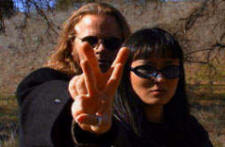 |
|
Clete Keith and Minae Noji |
In the past few years, advancements in digital filmmaking have spawned a mini revolution in the amount of films being made each year. With access to non-linear editing and high quality camcorders, today's independent filmmakers have an unprecedented ability to make movies that probably couldn't have made just a few years ago. Many filmmakers today are making not only digital shorts, but also digital feature films. In the days of 16mm film and sync-sound, that wasn't possible unless one had access to a decent budget and/or breaks on equipment and film costs. Today, filmmakers looking for their big break also have access to a wide variety of film festivals caterering specifically to them.
Brothers Christopher and Clete Keith set out to make a feature film called "Instant Trauma." The story revolves around a guy named John Cameron (Clete Keith) who sustains a head injury while working in an auto shop. He wakes up in the hospital thinking heís John Lennon. And for the next 80 minutes, he puts his family and friends through a comedy that Beatles and John Lennon fans would appreciate.
Christopher L. Keith was the producer and cinematographer on "Instant Trauma." He has worked in the film business on the visual effects side for over twenty years, most recently on "Legally Blonde 2" (2003). We spoke about his adventures of producing in the world of ultra-low budget filmmaking.
William Kallay, From Script To DVD: Can you explain your role as producer on this project?
Christopher L. Keith: Conceptually, my brother came up with the idea of doing a low budget feature. In order for us to finance it, we literally had to have a subject matter that was conducive to a low budget. He came up with the idea of doing a documentary-style "mockumentary." Obviously, "The Blair Witch Project" (1999) had done this before. But our take on it was a little bit different in that we wanted to make it as real as possible using good actors. So my role was to break down the script and figure out what it would cost, which was really hard because we had nothing. We didnít have cameras. We didnít have sound. We didnít have anything. So I bought the [Canon] XL-1. I talked to a friend of mine, who had a sound mixer and some microphones, and I got him to buy a boom pole.
FSTD: How did you go about casting the film?
Keith: My brother was in a theater group for 17 years. The people he pulled in were people he knew.
FSTD: Were there any actors you cast that you didn't already know?
Keith: The main actress, Minae Noji, who played China, the Yoko counterpart, we didn't know. She was the first one and she was the only one we needed to get because we didn't have an Asian lead. One of my brother's friends said, "Hey, I know somebody." So my brother met her down at Starbucks and had her read a couple things. She asked what we were doing. So he gave her a tape of a short we made called "Barely Alive: The Lars Vanermeer Story," which is about a guy who gets attacked by the same bear four times. My brother's got this wacky sense of humor. We thought, "Oh jeez. It's a 10-minute movie and it's not that good." We like it. It's funny. But it's so off-the-wall that we thought, "Oh gosh, she might not like it." Anyway, her boyfriend is English, so she totally gets that kind of humor, I guess. She came back the next day and she said she laughed her head off. And then we got into a better dialog and Clete looked at her audition tape and said, "She's got it. She's perfect." I said, "This is the only one you've looked at." "She's the one. She can do it." My brother's really good with that. So I said, "Okay, fine. I trust you."
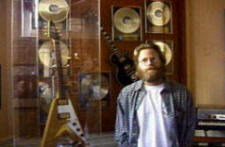 |
|
Clete Keith as John Cameron |
FSTD: You shot this film over the course of a year-and-a-half. Were your actors understanding in coming back to shoot on numerous occasions?
Keith: Fortunately, Clete knew their personalities. We had to shoot for ridiculous amounts of time each day. Without doing it the way we did it and knowing their personalities, I don't know if we could've done it, especially if it was scripted, forget it. They believed in the project and we sold them on it. If you have enthusiasm and you sell people on what you're doing and your passion, it's remarkable what they will do.
FSTD: Did you work under the Screen Actors Guild guidelines?
Keith: Everything from the beginning to the end of post production, you had to do it with SAG Experimental [rules]. I went to their one-day course and got them to approve it.
FSTD: Tell us about your script. There wasn't any dialog in it. How did your actors manage?
Keith: The script was written without dialog. It was just all the ideas of what we wanted in each scene. The actors never knew what the script was about. We would set up the scene by telling them what happened before, what theyíre thinking and all that. Give them key words to use and then turn them loose and let them basically ad lib. Itís kind of like "Curb Your Enthusiasm" on HBO. We did exactly the same thing before we knew they did it, because, obviously, this was three years ago we started our film.
FSTD: Did you have any kind of incentives for the actors, other than being in the film and getting cast credit?
Keith: Nothing. You would be surprised what you can get if you're honest and enthusiastic. That's been the key to everything my brother and I have done. We're not snake oil salesmen. And we're not scamming anybody. The incentive for the actors was not only their enthusiasm for the project, but they saw a potential of what they could do as a character.
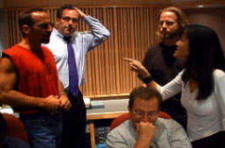 |
|
Cast from "Instant Trauma" |
FSTD: On even small independent films, there are certain luxuries for the cast and crew. For instance, private trailers, catered food, etc., are fairly common on a set. In contrast, what were some of the luxuries you had on "Instant Trauma"?
Keith: We were just coming off "Legally Blonde 2." That's actually kind of a moderate budget. I think it was about $50 million. That's a healthy budget to me. But basically half of that is fees to the actor. Twenty-five million dollars for a production is pretty low in today's standards. It's remarkable what they have. When we went on location there, the lead actress has a jet to fly. The rest of us go in another jet. And food on the set! Great food, all the time. You're never hungry. I look at this stuff because coming from doing our movies and then stepping onto the sets, there's so much luxury. And everybody takes it for granted on the set, you know, because they're used to it. I come on there and look at it completely different. On our film, we had to think about the stupidest things. I would go to Costco just to buy water. At least our actors would have water. But then I've got to think about them going to the bathroom. I would ask my brother, "Where do we go to the bathroom?"
FSTD: I understand you had to steal some shots when the opportunity arose.
Keith: A lot of times we were stealing shots. We were showing up in separate cars and trying to get the shots done and get the hell out of there. We can get in, hit and get out. A specific example would be when we shot where the murder had taken place. We used this apartment building in Santa Monica. Here we are shooting away and this lady comes out and says, "What the hell are you guys doing here? This is private property!" And we had already gotten half the scene. We couldn't leave, because we'd have to re-shoot everything. She started yelling at me, and since I was the camera operator, that's the one to yell at! I just said, "You're right. I'm really sorry." And then she said, "What are you guys shooting?" I said it was a college project. If you have just three people, you can always say it's for a college extension class. I said that if this actor would get his lines, we would've been out of here ten minutes ago. And she started laughing! I just got her to laugh. And then by the end of the ten minute conversation, she says, "I'll give you five more minutes, but get it done and get out of here." She went back in and we just continued on. And we were there for more than five minutes.
FSTD: How many hours was an average shooting day?
Keith: It would be based on when we could get the actor and how long they can afford to be with us. We were always based around their schedules, because we couldn't really tie them into really anything. We never really shot more than probably eight hours. We wanted to it to be like a documentary, so we weren't going to have a lot of intercuts. The scenes would play out in one take. Once the actors got their lines down, we could get really long scenes in a really short period of time, and then move onto the next. We never went more than eight hours, literally.
FSTD: Don't you have to follow certain SAG rules, though?
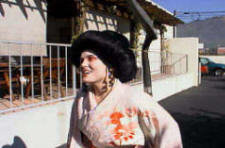 |
|
Diane Adair |
Keith: I did follow all the paperwork. We'd have the actors meet. We have to establish what your production office is. The production office was basically the main house we used all the time. That was Diane's, the lead actress. It was her house. And we shot in it, too. Then if we went anywhere, we'd take them or drive them to the location. So we followed all their basic rules. Because our days were so short, we'd do four hours with one actor, then they could go home. Sometimes if we ran long, we'd ask them, they'd say they didn't care.
FSTD: But sometimes on non-union sets, you can go for hours and hours without a break.
Keith: Non-union, you can get away with whatever. And you go for a long, long time. Those are brutal. You're working twelve hours a day and the crew's working fourteen. Like I said, our days were pretty short, we never really abused anybody. Sometimes we were pretty tired and hungry at the end of the day, but we'd make sure we went out and got something to eat. You can't abuse them, because you know you're going to lose them down the line. And with SAG Experimental, they have final approval. If they don't like a scene they're in, because they're not getting paid for it, they can say they don't want in there. Pull it out. They can literally do that. And SAG does own the film. If we ever sold it, the first thing we have to do is pay back the actors. I'd love to pay my sound guy and myself and my brother, but they really deserve it first. That's what I would do. And then anything that was left, we'd just share. We made it as a calling card. We didn't anticipate it coming out really as good as it did.
FSTD: Can you talk about your experience at the film festivals?
Keith: The film festivals were interesting. We had our own screening at Fox. We sent out invitations and got almost 500 people. It was fantastic. I would've never expected the reception it got. We sent out a 1000 post cards to get agents, production companies and anybody interested in it. Any connection we could get, we sent out a post card. We had all these visions of people coming in to see that we could put together a film. And the fact that we made an 80-minute feature for $5,600, I'm very proud of it. People stayed. Nobody left during the credits. Lights came up. They still stayed there. It was one of the best nights I've ever had, because it was just like a confirmation that that two years were worth it all for that eighty minutes.
FSTD: Was "Instant Trauma" accepted anywhere else?
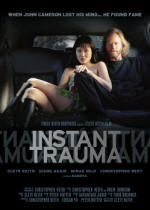 |
|
DVD cover |
Keith: We got into the Sedona Film Festival and the Nashville Film Festival. It's surprising how many we didn't get into. I think because it just doesn't play to one [person]. Because the way it starts out, as you've seen, it's almost like, "Oh my god, we're in for trouble." It's like a home movie type-thing, which is kind of how it was supposed to start out. But in retrospect, maybe that wasn't the proper way to do it, because if that's the first impression people have (of your film). In a theater, you got them trapped. On video, you have to go out with your best shot at the beginning, because, man, you'll lose them so fast. If they have the ability to have their hand on the button, they're gone.
FSTD: How was Nashville?
Keith: Nashville was a gas, too. They really, really enjoyed our film. The festival people were excited to have us there. They treated us like filmmakers. It was really fun to kind of be validated for the hard work you put in. It's always a letdown, always a downer afterwards. Because you're faced with, "Okay, no other film festival has come through. We're probably not going to sell it. What are we going to do next?"
FSTD: Then why go through the time, money and long hours to make a film?
Keith: You figure most filmmakers never even finish a film when they set out. It's really hard. It's not that easy to make a film. You just do it for the high of making it and finishing it.
Thanks to Christopher L. Keith and Harrison Ellenshaw
